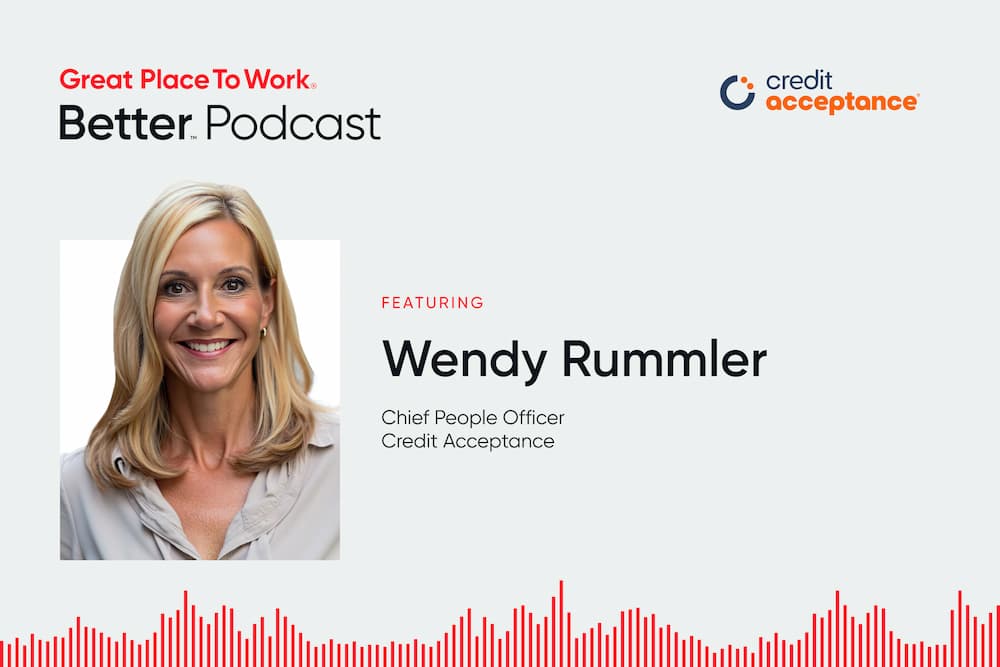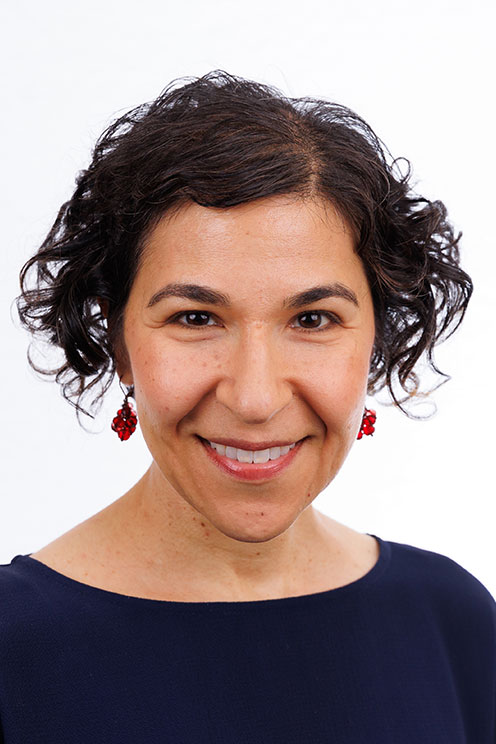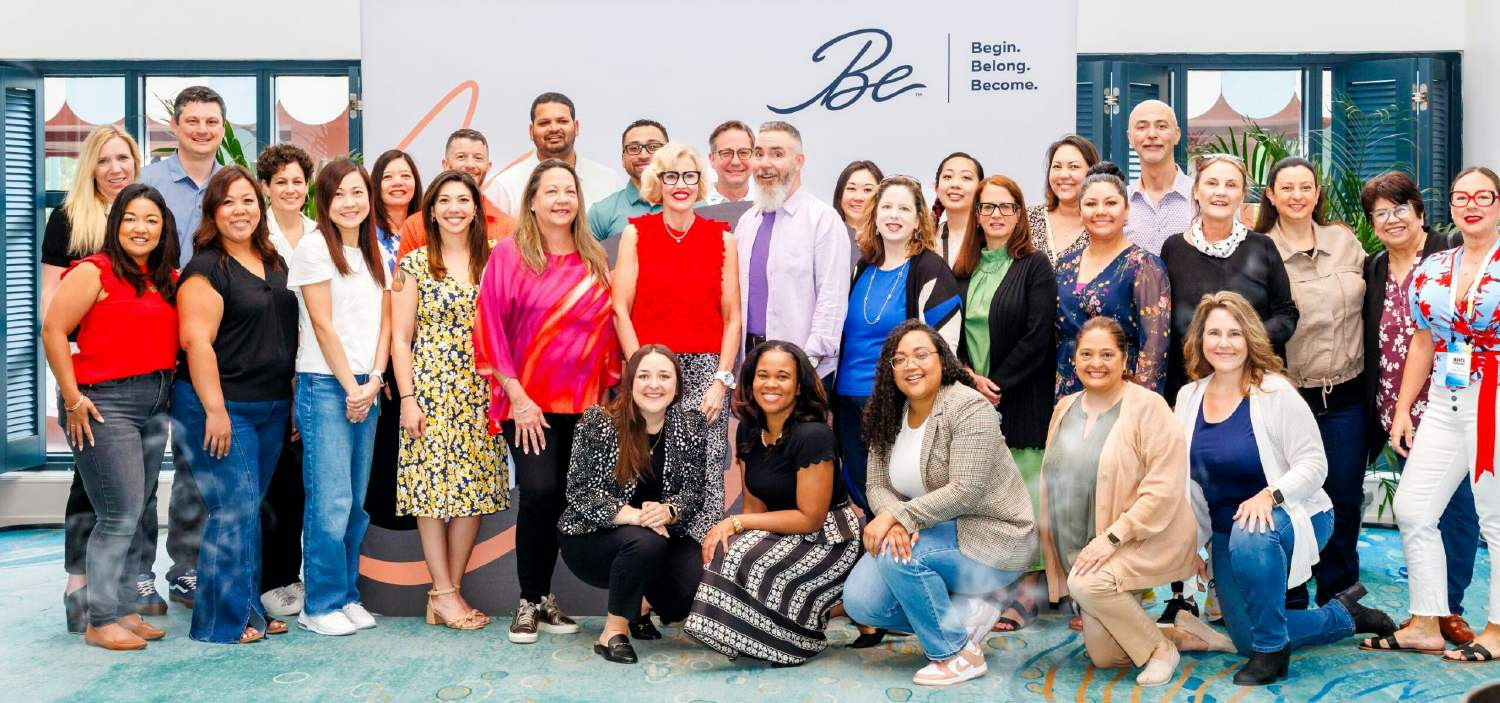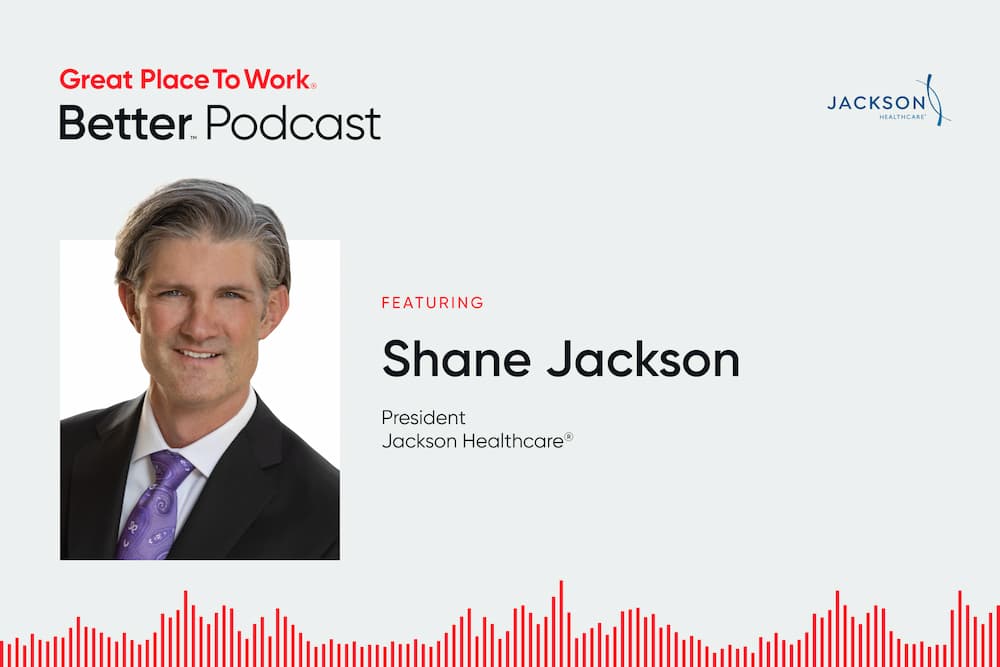Employee Listening, Employee Well-being, High-trust leadership
Wendy Rummler, chief people officer at Credit Acceptance, wants mental health and well-being to be a regular topic of conversation in the workplace. She joined the “Better” podcast to discuss the importance of mental health, well-being, and connection in the workplace. She shared her personal journey with mental health and well-being, and how it shaped her leadership style.
During the pandemic, she experienced anxiety and panic attacks, initially thinking they were physical health issues. She said, “I was trying to prove to myself over and over that it was actually physical, and it wasn't.”
Realizing her struggles were mental health-related was a turning point. “Once I admitted that, it was like, how are people not talking about this? How can this happen to you and you can't control it? …. So I wanted to scream it from the rooftops: ‘This is what people are going through. Why are we not talking about this?’”
She shared her story at a sales leadership event with 700 people and discovered that many others were facing similar challenges.
Helping dreams come true
Credit Acceptance is committed to supporting workplace well-being through its program “Unburying Your Dreams.” Inspired by Ben Nemtin, a former athlete who overcame depression, this program encourages employees to rediscover their passions and achieve their bucket-list goals. The company has launched workshops, provided journals for tracking dreams, and helped employees make their wishes come true.
Maintaining company culture in a remote world
The company introduced regular “coffee chats,” one-on-one meetings, regional roundtables, and virtual meetups. About 70% of employees meet weekly with their leaders, and 90% at least bi-weekly. These conversations go beyond work, focusing on genuine care and well-being. “To me, meaningful is not just that we're talking about work priorities. It's, do you care about me? Are you checking in with me?”
As employee trust scores improved, so did the stock price
Credit Acceptance’s recognition as a great place to work didn’t happen overnight.
It was the result of intentional changes initiated in 2001 by its CEO when the company’s stock was $9. This transformation was driven by listening to employees. “We started talking to our team members. What do you want? We have a methodology for feedback. If you listen to your team members, you have to respond in one of three ways... Our leaders all know that.”
This led to significant improvements in employee trust scores and landed the company on the Fortune 100 Best Companies to Work For® list since 2014. The company’s stock has reached as high as $614.
“This is not a, oh, we'll be a great place to work. Flip the switch. It took a lot of time.”
Roula (00:18):
Welcome to Better By Great Place to work the Global Authority on Workplace culture. I'm your host, Roula Amire, content director at Great Place to Work. I'm excited to have Wendy Rumer, chief People Officer at Credit Acceptance. Join me today. We dive into mental health, wellbeing, and connection and how supporting employees has boosted the company's stock price. She shares her mental health journey and how it's helped shaped her as a leader and as a mom. She tells us about the three ways leaders respond to feedback, which I hope everyone listening will take to heart or better yet implement at their company. They also have a program that I love which helps employees achieve their bucket list wishes. It doesn't get much better than that. Stay tuned for an inspiring conversation. Wendy, welcome to the podcast. Thank you very much. You have been the chief people officer at Credit Acceptance for the past few years, but you've spent most of your career in accounting and
Wendy (01:24):
Finance. Yes.
Roula (01:25):
I'm curious, how has that background helped you in your current role or has? It
Wendy (01:30):
Definitely has. It has been a transition for sure to go from finance and accounting to people, but my progression through the company also involved grabbing pieces of hr. So I had compensation and benefits move up under before I went over to hr, so I had a pretty good understanding of it. But having the numbers, knowing the business really well, how we make money, how people impact that has been very beneficial in making decisions in the HR realm.
Roula (01:58):
Credit acceptance is no stranger to a list. You've been on the Fortune 100 best companies to work for list for the past 11 years and three years on people, magazine's, companies that care list, and that's really where I want to focus our conversation today on mental health and wellbeing and the impact on business performance. Before we get into that, if you don't mind, I'd like to start sharing a bit of your story. During COVID, you experienced some anxiety, panic attacks, headaches, things that were new for you. Can you share a bit about how you were feeling at the time?
Wendy (02:33):
Yeah, I can, because I think for so many of us, I was that typical type A personality. So 4.0 student valedictorian, high performing athlete. So failure, weakness, anxiety, that was not acceptable. You just work harder, you push harder. And to be very honest, I was someone that thought that was really silly, just deal with it. During the pandemic, when I started experiencing what were very physical symptoms, headaches, I couldn't move my upper body. I was certain I had a physical medical condition. My doctor kept telling me, no, this is probably mental. And I just didn't believe him. So bless his heart. He Your regular medical doctor? Yeah, unusual. My regular medical doctor said, they think you're having some mental struggles here. And I told him no, that would not happen. Ridiculous to me. And he bless his heart, he put me through so many tests, like every test you can imagine on a treadmill, incline, 20 minutes.
(03:29):
And he's like, your heart rate isn't even going up. You are physically fine. This is mental. So once I admitted that, it was like, how are people not talking about this? How can this happen to you? And you can't control it? And I guess I've always been a pretty confident person, so I wanted to scream it from the rooftops, this is what people are going through. Why are we not talking about this? This is terrible. You can't control it. So thankfully, my husband and my family and my work, so Ken is our CEO, were super supportive people were like, whatever you need, oh my gosh, you can't believe you're going through this. So I was very comfortable getting the help that I needed talking to someone. So after that happened, ed fron him. You may know him or not, he was associated with Yes, I do. With the institute, started to work for us and he encouraged me to share my story. And at our sales leadership exchange in 2022 on a stage of 700 people watching, I very nervously shared that what had happened, and it was just the outpouring of people that were similarly struggling and feeling okay to share it. It's just been really impactful and I'm a different person
Roula (04:43):
Now. Yeah, I can relate on a few levels just of your body telling you That also happened to me during COVID for very different reasons. Check in your July, something's gone awry. You're like, I think that can't be
Wendy (04:55):
Exactly.
Roula (04:56):
It just doesn't even enter your brain if you're not used to running into some of these issues. So a couple questions for you. When your doctor was saying this isn't something physical and you were insistent. Yes, it is. And did he run those tests just to kind of indulge you and show you, and is that how you then realized, because we went from saying this is not possible to then saying, oh my gosh, and then sharing it. So for others who might be in a similar boat, how did you go from, oh yeah, this is happening to me?
Wendy (05:28):
I think because the symptoms were so bad, I started having panic attacks on a regular basis during a work call. I had to drop off the call so I could not get it to stop. So I started like, okay, if you don't think it's physical, then how can you help me? And he gave me some medications that did help, and when they worked, I was like, oh, he might be right. I think it was just the symptoms like this isn't solely out. And I did some crazy things like ride my bike up a hill as fast as I can. If it was physical, I'd have a heart attack and it would be done. And that didn't occur. So I'm like,
Roula (06:04):
I
Wendy (06:05):
Was trying to prove to myself over and over that it was actually physical and it wasn't.
Roula (06:10):
And then you mentioned you went to your CEO, Ken, then you spoke in front of leaders. Were you worried about what he might think when you first approached him and told him what you were going through?
Wendy (06:20):
Yeah, yeah. I mean, I probably hid it the first three months. I had a couple really good friends at work. They noticed me drop off a call, which was very unusual and called me right after what happened. Why didn't you just drop off that call? And I shared it with them. But yeah, I was nervous. Do people do think how I felt going into it? This isn't a real thing, get your stuff together if you'll, but that he wasn't that way. And I actually found that he had had family members that had similar struggles. So people hide this, hide maybe is the wrong word, but you just keep it to yourself because you're so unsure of the response you're going to get.
Roula (06:55):
And going in front of what, 700 of your colleagues? That obviously takes a lot of vulnerability.
Wendy (07:00):
Well, my leg was shaking. I mean, it was just shaking, standing up there. Yes.
Roula (07:05):
But you felt it was important to do because you did it. I did. Why? I think
Wendy (07:10):
Because I was so shocked that that could happen to me and if it could happen to me, how many other people were struggling with it. And as you shared more, you heard, oh yeah, I struggle with that too, or Yeah, my family member struggles with that and I'm like, so many people struggle with this. So I thought it was really important from a executive at the company, and I was newly into my role as the head of HR to stand up there and say, this is okay, and this happens, and we're here to support you as a company, as was all these people sitting around you in the room right now where for me,
Roula (07:48):
Yeah. I think vulnerability is so powerful in leadership or just in general. Even just in the last, I'd say year or so I've learned being vulnerable and sharing some of my experiences and then someone can connect with that. It's rewarding. You're helping someone else. You're using it for good to say, watch out for these warning signs, or this happened to me or I've struggled with this. That's a way to pay it forward
Wendy (08:14):
In a way. And it is hard to get past the, I think we're somewhat raised to think vulnerability is a weakness, definitely. And if you are the leader, you should have all the answers and you should be strong and can handle everything. And you're right, it's just a strength. The more vulnerable you are, the better leader you are, the more people want to come along and perform and share. So it is a huge strength to share.
Roula (08:43):
So here we are in 2025 and wellbeing, which took center stage during the pandemic has reverted back to pre pandemic levels, which is extremely disappointing. Loneliness has become an epidemic in the us. I want to talk through some of the things you're doing to combat this and help your employees feel connected, most of whom are remote. Is that correct? Yep. So let's start with a guy named Ben Ton. Yes.
Wendy (09:09):
He's
Roula (09:09):
The bestselling author of What Do You Want to Do Before You Die? And you've used his Buried Life mental health workshops to help Unbury dreams of your own employees and help them live their dreams. Tell me more about this, how and why that
Wendy (09:25):
Started. Yeah, our chief operating officer was at a conference and Ben was speaking. He brought it to us and was like, I don't know. This guy was great. I loved everything he had to say. So we reached out to Ben and started a relationship and just his story and tell us a little bit what it was all based on. He had his own mental health struggles. He was a very high performing athlete, had a full ride scholarship and could not function and ended up leaving the university and went back home and basically locked himself in the basement in the house, very depressed. And his friends came and said, no, you're not going to do this. We're going to go, we're going to go on a road trip and we're going to unbury all our dreams. We're going to check everything off our bucket list. And as they did this, they found that helping other people unbury their dreams was just as rewarding if not more rewarding.
(10:18):
So they made this agreement that every time they check something off their list, they would help someone check something off their list and became this journey. And they made the MTV show where they were going around Unbearing dreams. So we just loved it. So we had Ben come in after he spoke to us. He said he's turned this into workshops. And he spoke to all of our team members in two sessions onsite, and we gave everyone their bucket list journals. And then we launched a campaign, which we still do called Unbearing Your Dreams. And we have a team site. People can go in and put, what do I want to unbury and care for yourself first? Help other people. So this isn't just about you. How can you help other people? And the company has unburied many dreams. For example,
(10:58):
One of our team members, her dream was to take her father back to Jerusalem. He was a retired preacher. She wanted him to be able to see the holy land. So we sent her on that trip and then her dad and her came and spoke to our entire company at a town hall. I mean, there was not dry eyes, it was pretty emotional. But as simple as we also had other team members that wanted to lose a significant amount of weight so they could go skydiving with their daughter. So we got them on a nutrition plan and help them lose weight. But you saw senior leaders, I want to lose weight too. So they went on the journey with him and all lost weight together down to I think more organic. I want to go see the White House, someone just put that in the teams channel. And this was at the end of 22 and it was really hard to get in the White House. And our chief legal officer was like, I got some connections. So she got them a tour into the White House so they could go live their dream and see the White House. I mean, there's so many stories like that and it's become really, really cool. So each year at our anniversary party,
(11:52):
We give a new dream out. We like to find them organically. I was going to ask, what's the process for submitting your dream? So some people just put it in teams other, we just have people listening. So at our HR onsite, this was the last dream we did last year, one of our team members on our team was sharing how he lost his best friend to suicide. And he used the words, and I have a dream to make suicide awareness top of mind for people, and I want to do this out of our darkness walk. And I'm hoping some of you in this room, my fellow HR team members will join us. And we were like, ding, ding, ding, ding, ding. So at the anniversary party, that was his dream. We raised, I think we were like seven times more. Anyone at that walk. There was 50 of us that showed up at the walk with him. And we're sending him to New York to do the overnight out of the darkness, walk with his best friend's wife and her family and and it makes me feel amazing that I'm part of it, but others is just, it's moving.
Roula (12:53):
Yes. That's incredible. Speaking of connections and helping support your employees' wellbeing, you hold round tables in several hub cities to create conversations and connections. What do those look like and why is that so important to do and what's the impact on your people?
Wendy (13:11):
Yeah, I mean, as you mentioned a bit ago, we're almost all remote now. So prior to the pandemic, I would say we were probably as far from remote as you could be as a senior executive team. I didn't have a laptop.
Roula (13:24):
Yeah,
Wendy (13:24):
No, you worked in the office on your desktop. There was no such thing as remote. So when we all went home, we were scrambling to get equipment and we were very metric driven, so we were measuring everything and everything was performing very well. And we leaned into our listening culture and our CEOs asking people, what do you prefer? And they said, we prefer to stay home. December of 2020, he's all in, sends a message to the entire company, we're never coming back.
Roula (13:52):
Wow.
Wendy (13:52):
And that early on, this is working very early on, but when you do that, we were intentional and we knew we were headed. So we were like, oh, we got to make this work.
Roula (14:01):
Right?
Wendy (14:02):
The regional round tables are something that spun out of that knowing that people are across the country in that human interaction and having a connection. We were very scared to lose our culture. We had already been on the list seven times at that point. We had a great culture.
Roula (14:15):
Things
Wendy (14:15):
Were working, working, and it was a big advantage. We knew it. We had seen the impact on our financials in our business performance.
(14:22):
So we spun these regional round tables up in areas where we have clusters of team members, and then we'll do a virtual one as well each quarter. So anyone can call in. But the format is we send a couple of senior leaders. So I'll go to generally vice president or above, and they'll lead content. It changes by the quarter, but always sharing what our mission, vision, and our purpose and strategy is at every single get together so people know why we're here. And then we'll have different interactive, whether it's talking about our core values and how people live them each day, whether it's talking about new initiatives from our product team. So there's some business content, and then it's just fun. We'll have 90 minutes where they're either bowling or going to arcades or just interacting and getting to know each other. And I've been to a few now, and you'll see people like hug each other and because that's when they see each other, the four times a year they come to it. So I just think it's very important, even though you're remote, that you see people face to face and have that feeling of connection.
Roula (15:20):
Can you share some other best practices for leading in a remote environment? We're hearing definitely in person connections. Bring your people together at different levels, have senior leaders talk with the employees. Very intentional.
Wendy (15:33):
That's the word I was going to go to. I think the biggest thing is being intentional. When you're remote, you're not going to run into someone in the hallway, so you have to be intentional to have the casual conversation. So our leaders have coffee chats, get together with their team for 30 minutes just to talk about how they're doing not work. So you have to carve out very intentional times to just check in on people. Another best practice is just meeting with your people on a regular basis. So we ask the question, how frequently do you have meaningful conversations, one-on-one with your leader?
Roula (16:11):
Not how frequently do you meet with your leader? How frequently do you have meaningful conversations with your leader? With your leader?
Wendy (16:18):
Yes.
Roula (16:18):
I think that's an important distinction.
Wendy (16:19):
It's an important distinction because meaningful, we'll let you decide what meaningful means. Because to me, meaningful is not just that we're talking about work priorities. It's do you care about me? Are you checking in with me? And we know that 90% of our team members meet with their leader at least every other week. 70% meet with their leader every week. They have a touch base. I've been there 24 years. I've had a one-on-one with my boss every week for the 24 years that I've been there. And that's our CEO. So if he can meet with me every week, everyone can meet with their team member every week. Those touch points I think are a best practice necessary. Being very intentional and just making sure you recruit leaders that really buy into your culture and that this is important, especially in the remote environment, they really have to have your DNA because you can't see 'em every day to assess that. So you got to do a good job making sure you're bringing on people that fit with you.
Roula (17:14):
Those are some great tips. Wellbeing certainly has an impact on the business. We know it impacts productivity and engagement. How does it impact the bottom line at credit acceptance? Why is this more than just a nice to have? I
Wendy (17:29):
Mean, our results show that it does. So I would say it was a little bit revolutionary. Our last CEO in 2001, when stock price was probably nine bucks, set a goal to be on the Fortune Top 100 list. To be honest, I don't know if he really knew why. He just knew in his heart that if people enjoyed coming to work every day, they knew they could make a difference. They were going to produce more. We were going to do better as a company. So he sets this goal in 2001.
(17:55):
We didn't make the list until 2014, so this is not a, oh, we'll be a great place to work. Flip the switch. It took a lot of time. We couldn't even take the trust index survey until 2007 because you had to have over a thousand employees, and that first score was a 69%. So wow, we had some work to do, but for five years, we just floundered 69, 70, 68, 71. We were making no progress. And we started really leaning into some of the, A theory from the Great Place to Worship Institute about listening to the people that know, do the work, know the culture. And we did. We started talking to our team members, what do you want? We have a methodology for feedback. If you listen to your team members, you have to respond in one of three ways. You have to say, yep, that's a great idea, and I'm going to take action.
(18:43):
And then we report back on the action that we took. No, I'm not going to do that. Thank you for your input, but here's why. And very importantly, you have to provide the why. You're not going to do it, or I don't have enough information. Can you give me more? Our leaders all know that that's how you're going to respond. We have town hall questions, our poll survey, that's how you should respond to feedback. But we started doing that consistently. And in 2012, following really this push, our scores went from a 69 to an 84, and then in 13 we were in 91. And since then, we've been somewhere from a 91 to a 94 for the last 12 years. Our stock price at the end of 2011 was 84. We've had some recent economic more difficult times, but in the last year, our stock price has been as high as 614. So we're this little gem that a lot of people don't know about that have. I mean, the returns have been massive. I mean, we have a group of people that want to work together, that want to stay there in a culture where they know they make a difference, helping people with challenged credit get into a car. So it's very, very important.
Roula (19:46):
And so the thing you changed was how you listen, listening, getting feedback, responding to the feedback, and then that had a ripple effect on the culture. And we see the impact on the stock price
Wendy (20:01):
Absolutely. And so forth. Absolutely. I would mention two other components that we changed. We put in a framework that we call organizational health. Our president back in, I think 2007, looked at what
Roula (20:13):
Are the things that make an organization healthy? So we have 10 dimensions, right people, right number org design, clear expectations, several more.
Wendy (20:21):
But the reason he did it is as we were going through this time of trying to change the culture from 2007 to 2012, he would hear, we're not doing well in this area because this person, okay, let's give rid of that person performance, manage them. That area didn't improve. Well, it's because of this person. So we put these 10 dimensions of org, health people is one of them. But we train folks that that should be the last dimension you look at. You should make sure you've created the right environment, have the right expectations, measurements, do you have the right number? Have you organized? And if you've done all those and feel very confident, we assess them, red, yellow, green, and our business partners in HR help with that,
(21:01):
Then maybe we have a right person problem. But let's not start there until we know that we've set them up for success. So that was huge in the listening culture. And then our core values, our pride values are not just words on a wall. They were written by our team members. So in 2012, we did a survey. Tell us about someone that you work with that you admire. We got, I think, 550 responses. And that became our positive, respectful, insightful, direct, and earnest, our pride values. And we hire to those, we performance manage to those, we terminate to those. I don't care how well you perform, if you do not operate with pride, you cannot work at credit acceptance. It's the how. It's not the how. It's just the what. It's not just the what. We can get a lot of people to do the what.
Roula (21:53):
Hey, everyone. If you like listening to the podcast, then don't miss the Great Place to work for All Summit in April in Las Vegas where you will learn from the best in the world, meet more than 1500 leaders and get insights on what the data says drives business success. And that is people and culture. I promise you. Leave inspired and ready to transform your workplace. Use the code better to save 20% off registration. Lincoln Coder in the bio, don't miss out and I'll see you there. We talked about dreams. What did you want to be when you grew up? Did you have a dream? Have you achieved some of your dreams? Are there still something you want to unbury for yourself?
Wendy (22:42):
It's interesting. I mean, as a child, I always knew I wanted to be super successful. I wanted to be a leader. As a
Roula (22:49):
Child, you knew this.
Wendy (22:50):
Oh yeah. I really was always that way. I remember telling my parents that I was going to be like the head pediatric surgeon. That's what I wanted to be. I went away from the doctor thing into business. But I will say moving into the HR realm has filled that a little bit. Helping people. It's very different than being in your spreadsheet, interacting and feeling you can make an impact on someone's life. But outside of that, my dream was always to be a mom and have a family. I'm very close with my family, so I've achieved that dream. I have three beautiful children.
Roula (23:24):
That's great. That's great. That's a great dream to have. What advice would you go back and give your younger self
Wendy (23:30):
Perfection is not required and that there's strength and failure. I know a lot of people that got Cs that are really successful
Roula (23:40):
And happy
Wendy (23:41):
And happy. So I talked a little bit about seeing real change in me. I was the mom that stood over the table with my daughter. I do not understand why you don't know these math facts. Get your times tables down and you should have a 4.0. My kids should all have all A's. And after that happened, they'll say, you are a different person. No, it's not what this is all about. Just work your hardest. I'm just so much more patient. So if I could go back and tell my younger self that it would save a lot of stress and anxiety.
Roula (24:13):
So you had compassion for yourself and you took off the, you have to do this 150% all the time at work and at home and for your family, and it's changed.
Wendy (24:25):
It's changed me. I will say that hat hasn't come off me completely. Just in my nature. If I do anything
Roula (24:31):
Lightened,
Wendy (24:32):
It's lightened. I guess what I want to do, everything 150, 200%. If I don't achieve that, that's okay. That's the part that's changed. But to me, everything's a competition. You should win it all. You should go as hard as you can at everything, but it's okay if you don't get there.
Roula (24:51):
Is there a book or podcast you would recommend to your peers?
Wendy (24:53):
So one not work related that I would recommend anyone is The Body Keeps the Score by, I am familiar, Bessel Vander Cloak. And it just talks about how trauma you store it in your body and Big T, little T, that book difficult to listen to at times. There's some hard subject matter in there. But yeah, just, wow. My husband initially joked because I would start analyzing him, do you know this is why you
Roula (25:25):
Wait? Once your mind is opened, then so you almost, you want to help. It's coming from a good place. Yeah. It's almost like, what are you talking about?
Wendy (25:35):
No, for sure.
Roula (25:35):
Well, you might think you're good.
Wendy (25:38):
Yeah, that was a very moving book. And from a business perspective, when we did the speaker series, we had Ryan Leak, I dunno if you've heard of Ryan Leak. So he's an author and a speaker, and he wrote the book Chasing Failure. And it's about, it's great for business. He also does workshops with it. But it's just about how if you're always chasing failure, you're taking those risks and willing, getting comfortable that it might not always work out. Just how much more you succeed, how much further you push yourself. That's a great book.
Roula (26:08):
Chasing Failure. Tell me a little bit more. What does he mean by chasing failure?
Wendy (26:12):
Stretch yourself to try to do things where you might fail.
Roula (26:16):
Okay, take a risk.
Wendy (26:17):
Take. Go for it. Take a risk. Go for it. And his story was he always wanted to be in the NBA. And so he went and he tried out with the Phoenix Suns and he failed. He didn't make it into the NBA, but just the process of doing that, how much he grew. So just how you can apply that to your life.
Roula (26:34):
We've touched on this, but how do you keep a sense of wellbeing for yourself? Now? Obviously mentally you have different tools, you cut yourself a break, but are there other things you do in your day to day that you never did before?
Wendy (26:47):
I exercise regularly. I always did that. But I think the other thing that I do is I just take time for myself kind of alone, which I wouldn't have done that before. You just have to have it all waste done of time. That would be a waste of time. It was go to bed at 12:30 AM when everything gets done, and I needed to be the gym at four 30 in the morning. And I did that for years. There was no stopping ever until my body said, you're done. So that now it's like, oh, I'm going to sleep in until nine o'clock on a Saturday. That's what I need to do. So that sounds silly, but just sleeping and being alone is probably the biggest change.
Roula (27:27):
The through line there is you're listening to your body. It is keeping the score and it is keeping the score and it will betray you.
Wendy (27:36):
Or maybe it's not betraying you, maybe it's helping you.
Roula (27:38):
Yes. Yeah. It's speaking to you. We just have to learn to listen to it. Yeah. Well, Wendy, thank you for joining. It's been a pleasure to have you on. Thanks for sharing all your tips and insights. Thank you for having me. This has been wonderful. It's been great. Thanks for listening. If you enjoy today's podcast, please leave a five star rating, write a review, and subscribe so you don't miss an episode. You can stream this in previous episodes wherever podcasts are available.
Get recognized for your culture
Gain accolades for your workplace environment and attract top talent who share your values.











